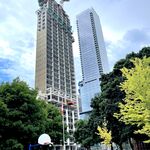TheKingEast
Senior Member
You two should really choose to agree to disagree and move on.
In theory you could take a loss of course. In reality, where in the Toronto condo market is this happening? If this doomsday scenario is as common as you propose, it must be affecting a large portion of the condo resale market. If this were true, Toronto wouldn't be the world capital of condo speculation.
If Toronto ever had an earthquake that is greater than magnitude 5.0 (and has an epicentre closer to Toronto, rather than in Nipissing or in Quebec), I wonder how many condos would collapse.
Wait, is this guy seriously arguing that the concept of losing money on a condo is so outlandish that it doesn't even bear considering?
If Toronto ever had an earthquake that is greater than magnitude 5.0 (and has an epicentre closer to Toronto, rather than in Nipissing or in Quebec), I wonder how many condos would collapse.
Wow....I thought the last poster was kidding but you guys sound like you're actually serious! You do know that Ontario has a Building Code, right? And every high rise built since the 70s takes earthquakes into account? I can't believe people actually think like this.Every single Urbancorp and TAS one, I'd wager. Those are just the two builders I KNOW are rubbish crooks. Don't know about the rest too well.
Well at the risk of being repetitive, the proof is in the pudding as freshcutgrass said. If the risks you mention don't translate to an actual trend of condos having more maintenance issues than other types of buildings, that means that condos are no more risky than any other type of ownership. Condos have their advantages and disadvantages just like anything else, and for many people condos make the most sense. They may not be for you, and that's great, you don't have to buy one. But that's no reason to be against condos in general.>>I never said the risk is greater, or smaller. I've been saying that the risk is there, and the condo owner has FAR less ability to do anything about it. If you're in a condo with problems, it really doesn't matter if the homeowner down the street is worse off, you're still stuck with your condo problems.
I was doing nothing more or less than the people whose experiences you used to back up your point.Because you are trying to generalize from your experience. "My condo experience has been OK so far, so that means condos are a good choice."
Condos have their advantages and disadvantages just like anything else, and for many people condos make the most sense.
Wow....I thought the last poster was kidding but you guys sound like you're actually serious! You do know that Ontario has a Building Code, right? And every high rise built since the 70s takes earthquakes into account? I can't believe people actually think like this.
Can we get back to the one sided nature of this program? One lady can't open her door because the handle isn't working proper = condo buyers are going to hell? Really stretching it aren't they?
But then again, people who wait in lineups for hours to spend hundreds of thousands of dollars on nothing more than spec drawings and renderings probably don't have to worry about their cash flow.
Can we get back to the one sided nature of this program? One lady can't open her door because the handle isn't working proper = condo buyers are going to hell? Really stretching it aren't they?




